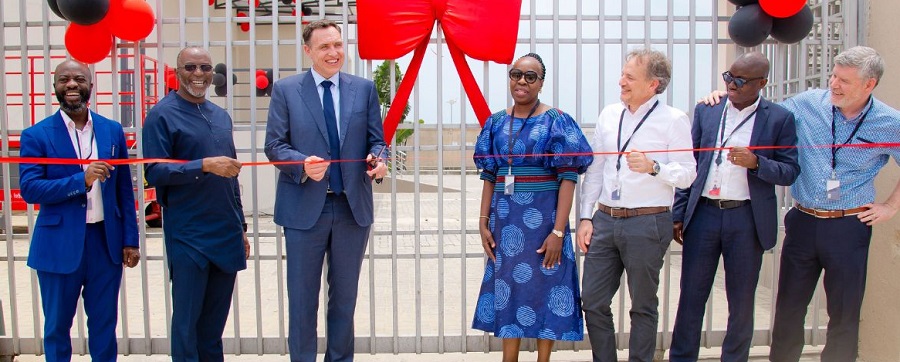E-Business
Resourcery, VCE Proffer Data Centre Solution for Public Sector

West Africa’s foremost Information Technology Company, Resourcery in conjunction with VCE, the worldwide leader in converged infrastructure, held a one-day interactive business session for senior executives of government agencies in Nigeria’s federal capital territory, Abuja, tagged “Data Centre redefined.”
The session provided an opportunity for both companies to dig deeper into the “the VCE converged Infrastructure advantage” as it relates to improving efficient service delivery in the public sector.
Amechi Okonkwo, Business Solution Manager, Computing, Servers and Storage for Resourcery noted that it’s no longer in doubt the emergence of VCE’s V-block has re-shaped Data Centre efficiency and Resourcery prides itself is a leading player across West Africa in terms of installations of the V-block.
“Resourcery is a very innovative organization and we strongly believe in making good things better. This is evident in how we work with our partners and our customers. The same expertise is what we have deployed in providing the V-Block Data-Centre solution in some leading private organizations in the country.”
Amechi also added that; “Seeing the huge impact the solution has made in the private sector, it was important to provide the same platform to the government agencies in a bid to enhancing their Data centre experience and usage without losing track of its unique environment. We sincerely trust that this business session would serve as an eye opener on the inherent benefit of the V-block to ICT managers in charge of government businesses in Nigeria.”
On his part, Eyad Badder, Chief Client Solutions Director, VCE, expressed his delight to be in Nigeria to work participants through the revealing journey of the V-block converged infrastructure that is full of so many advantages because it draws from the strength of Cisco, EMC and VMware.
Eyad said; “the organizations goal since inception has been to free business organizations and this case, government agencies from expending resources and effort managing infrastructure so that they better serve the government’s developmental efforts by delivering next-generation services to their end users.”
He also said; “that his organization approach is different from the convention ICT approach to data centre management because VCE focus on understanding the customer problem, integrating new technologies in one high-performance solution that is supported with one single cell. As a pioneer in the converged infrastructure market, we represent the desire of ICT managers to move into the infrastructure integration business seamlessly.”
In his remark, Abiodun Yusuf, Regional Manager (North) for Resourcery said with the interactive session, ICT managers from government agencies present would no doubt have seen so many reasons to embrace the converged Data Centre infrastructure solution inherent in the V-block solution. “With Resoucery as the integrating partner and the government agencies, it’ll be an era of simplified service delivery across board.”
E-Business
Equinix Launches LG2.3 Data Centre in Nigeria

Equinix, global digital infrastructure company, has launched a cutting-edge LG2.3 data centre in Lagos aimed at fueling Nigeria’s booming tech scene.

Equinix officials at the launch
The data centre is designed to provide businesses with secure, reliable, and high-performance colocation and interconnection services, crucial for supporting the increasing demand for digital services across the region.
Nestled in the bustling Lekki Free Zone, LG2.3 is packed with the latest tech, offering businesses the secure and lightning-fast connections they crave. Think of it as the engine room for Nigeria’s online world, designed to handle the explosive growth of digital services.
The launch featured Bruce Owen, president, Equinix’s EMEA, who cut the ribbon to open the data centre.
“Nigeria is our focus,” Owen declared, emphasizing Equinix’s dedication to powering the nation’s digital growth. “The energy here is incredible, and we’re excited to be part of it.”
On his part, Wole Abu, managing director, Equinix’s West Africa, echoed this sentiment highlighting the increasing global demand for digital infrastructure.
“Africa is on the cusp of a digital explosion, and we’re here to support that growth,” he said.
Nigeria’s digital adoption is skyrocketing, driven by a young, tech-savvy population. Businesses are racing to embrace online platforms, and LG2.3 is perfectly positioned to meet their needs.
This investment is set to create a ripple effect, boosting the economy, creating jobs, and fostering innovation.
LG2.3 is set to be a beacon for Africa’s tech potential.
Equinix’s confidence in the continent aims to attract more global players, turning Africa into a digital powerhouse.
This data centre will act as a vital connection hub, empowering businesses to connect and collaborate, bridging the digital divide.
Equinix’s vision extends beyond Nigeria, with plans to expand across Africa.
strategic move reflects their commitment to building a connected and thriving digital ecosystem.
The success of LG2.3 is a testament to the power of public-private partnerships, with the Nigerian government playing a crucial role in attracting investment.
As Nigeria marches towards a digital future, Equinix’s LG2.3 data centre will be a key driver of progress. It’s a powerful symbol of Nigeria’s digital ambition and a catalyst for Africa’s tech revolution.
E-Business
Microsoft Marks 50th Anniversary with Major Copilot AI Update

Microsoft is celebrating its 50th anniversary with a major leap forward into artificial intelligence, unveiling significant updates to its AI assistant, Copilot.

The announcement was made on April 4, 2025, at the company’s headquarters in Redmond, Washington, marking a milestone for both Microsoft and the AI industry.
As the tech giant celebrates its golden anniversary, the company is setting its sights firmly on the future, particularly with its AI-driven tools.
Microsoft’s Copilot, which has been integrated into various software tools across its ecosystem, has now received a significant upgrade.
The new features aim to make the Copilot assistant more intelligent, personalised, and proactive, which positions Microsoft as a serious competitor in the AI space against other industry leaders such as OpenAI’s ChatGPT and Anthropic’s Claude.
Mustafa Suleyman, head of Microsoft’s AI division, expressed the company’s ambition, saying, “We envision Copilot not just as an assistant, but as a long-term AI companion, one that can learn, adapt, and evolve alongside its users. This goes beyond just responding to commands; it’s about fostering relationships between users and their AI.”
The most notable update to Copilot is its new memory functionality. Now, the assistant can retain information such as preferences, previously used commands, and even personal context, making it more responsive and efficient in future interactions.
This means Copilot can, for example, anticipate a user’s needs based on past behaviours, from scheduling meetings to suggesting restaurants for a night out.
In addition to the memory features, Copilot’s new “Vision” capabilities extend the AI’s functionality across multiple platforms. Windows and mobile users will now be able to interact with Copilot using both the camera and on-screen elements.
This includes actions such as booking appointments, managing tasks, and even shopping online — all in a more interactive and seamless way.
Scott Guthrie, Microsoft’s Executive Vice President, shared his enthusiasm about the potential of these advancements, stating, “With these new capabilities, we’re not just reacting to AI’s capabilities — we’re shaping the future of how users interact with technology. AI can do so much more than just assist with tasks. It can enrich the human experience.”
The updated Copilot is designed to challenge industry competitors like ChatGPT and Claude, offering more personalised and context-aware interactions.
Microsoft has positioned its Copilot as a tool that not only assists users but builds a deeper, more intuitive relationship over time.
The company has also placed a strong emphasis on AI accessibility. With AI’s growing role in everyday tasks, Microsoft aims to make it easier for users to adopt and benefit from these technologies, regardless of their technological proficiency.
Despite past challenges, including legal disputes over privacy and AI ethics, Microsoft continues to push boundaries in the AI space. Guthrie remarked, “This is just the beginning. As we continue to innovate, we are reshaping how people work, interact, and live with technology.”
With Copilot’s advancements, the tech giant hopes to continue its legacy of innovation, making AI tools accessible and useful for people around the world.
E-Business
Report Suggests a Slash in Mobile App Usage By 2027 Due to AI Assistants

By 2027 mobile app usage will decrease by 25 per cent due to AI assistants according to Gartner, Inc. Smartphone users will turn to AI assistants, such as Apple Intelligence, ChatGPT, Google Gemini, Meta AI, and others to replace apps for many functions.

In addition to the impact of AI assistants, apps will be consolidated across separate brands and companies, creating mobile app partnerships or consortiums to reach more users per app at scale and defray the cost of creation and maintenance.
“CMOs should begin scenario planning for the impacts of decreased mobile app usage,” said Emily Weiss, Senior Principal for the Gartner Marketing Practice.
“Brands with low app engagement and retention will likely be first impacted – this will be a positive development for brands that are not overly reliant on driving revenue via apps as app development costs will decrease.
Other brands may be severely impacted by the disintermediation of users turning to AI assistants for services. The loss of app users will also result in the loss of first-party data collection and the ability to reach fewer users via mobile push notifications,” Emily added.
By 2026, Over 1/3 of Web Content will be Created for the Purposes of Gen-AI Powered Search According to Gartner’s 2024 CMO Spend Survey of 395 respondents between February and March 2024, the average CMO allocated almost a quarter of their digital marketing budget to search.
Other than end users directly visiting a website, search currently drives more traffic to the average commercial enterprise website than any other referral source.
Given this, a loss of search driven traffic due to algorithmic shifts by major search engines would result in tangible, negative commercial impact to any organisation.
“CMOs will need to direct their teams to hire talent with a strong understanding of how GenAI, and broader AI influences, impacts the performance of their content in search algorithms,” said Weiss.
“It will be important to upskill the function by investing in search and content talent with AI skillsets. These associates will need to have familiarity with creating or optimising content to train and rank within evolving search algorithms,” she said.
By 2028 digital Mlmarketers will move 30 per cent of their paid social budget to support advertising and partnerships on subscription-based channels It is becoming more challenging for CMOs to maintain, let alone grow, their reach and engagement among consumers.
This is especially true as consumers shift their tech and media behaviors away from social media, to other platforms and subscription based channels.
Gartner’s 2024 CMO Spend survey found that since 2022, paid social has maintained the highest budget allocation for all digital media spend. In 2024, B2C Marketing leaders reported allocating 14.3 per cent for their digital channel budget to social media advertising (an increase from 12.3% in 2023).
“Closed group communities and subscription channels of – fer a potential alternative for social media weary consumers and content creators who want to do more than feed the algorithm,” said Weiss.
“Brands can leverage closedgroup subscription channels – such as Substack, Patreon, and Discord – and the professional creators on them to reach relevant target audiences who are already engaging with content they self-selected into consuming,” she added.
Current AI models, such as large language models (LLMs), lack the agency to autonomously execute tasks and adapt in complex environments.
However, as new levels of intelligence are added, new AI agents are poised to quickly become more capable and reliable as brands seek to address customer facing use cases.
“There will be more AI agents than people, so while current approaches require humans in the loop, this idea will quickly become antiquated.
Marketers will need to determine when and how they can trust AI agents to act on behalf of the brand and customers across key areas,” said Weiss.

 Telecom2 days ago
Telecom2 days agoMafab Communications Has Launched 5G Services- Findings

 Broadcasting2 days ago
Broadcasting2 days agoBurna Boy, Other Nigerian Artists Pocket $38m from Spotify in 2024

 E-Business2 days ago
E-Business2 days agoDHL Signs MoU with Temu to Drive Sustainable Supply Chain Solutions for SMEs

 E-Business2 days ago
E-Business2 days agoEquinix Launches LG2.3 Data Centre in Nigeria

 Telecom2 days ago
Telecom2 days agoSophos Reveals Key Findings: 56% of Cyberattacks Exploit Valid Credentials

 E-Business2 days ago
E-Business2 days agoMicrosoft Marks 50th Anniversary with Major Copilot AI Update

 E-Business2 days ago
E-Business2 days agoReport Suggests a Slash in Mobile App Usage By 2027 Due to AI Assistants

 E-Financial2 days ago
E-Financial2 days agoTCL Launches ‘vetandpay’ to Combat Online Transaction Fraud

























